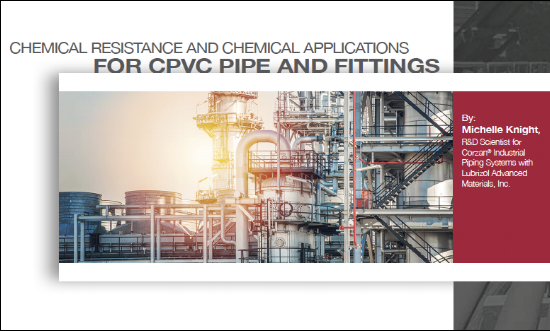Chemical Resistance
Corzan® CPVC Stands Up to the Harshest ChemicalsNo miracle material exists that is resistant to every chemical in the world. But only Corzan® CPVC gives you the comprehensive data you need to determine whether Corzan CPVC will be suitable for your application.
Corzan CPVC and Aggressive Chemicals
One of the most attractive attributes of Corzan CPVC is its resistance to corrosive chemicals – the same chemicals that can degrade and reduce the service life of many metals. In industrial applications, this corrosion can potentially cause expensive maintenance, disruption of operations and property-damaging leaks in these systems. Corzan CPVC can accommodate wide pH swings in the fluids it transports.
Corzan CPVC provides superior, long-term resistance to corrosive chemicals, seawater and demineralized water, even at high temperatures. In fact, Corzan CPVC effectively stands up to most acids, bases and salts. It can also reliably handle aggressive chemicals such as:
- Hypochlorite.
- Caustic soda.
- Sulfuric acid.
- Chlorine gas.
- Hydrogen sulfide.
- Alum.
The Corzan CPVC Chemical Resistance Table
Lubrizol Advanced Materials prides itself on thoroughly testing its products to ensure customers get only the best, most predictable results. That’s why we provide you with free, interactive data on Corzan CPVC’s chemical resistance to over 400 different chemicals and compounds. Use the Corzan CPVC Chemical Resistance Table now.
Corzan CPVC Stands Up to the Harshest Chemicals
Corzan CPVC is tested against over 500 chemicals and compounds for suitability and formulated to effectively stand up to most acids, bases and salts. It is also innately resistant to corrosive chemicals, including the 10 commonly used chemicals that can degrade and reduce the service life of many metals.
Select a chemical to explore why Corzan CPVC is the more suitable choice.
Whitepaper: Chemical Resistance and Chemical Applications
